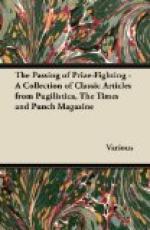Deafening were the cheers which greeted the gallant captain! A meeting of ladies has since been held, at which resolutions were passed for the furtherance of so desirable an object, and a committee formed for the selection of a design worthy of the originator of the Knocker Hunt. To that committee we now appeal.
[Illustration:
TO HENRY, MARQUESS OF WATERFORD,
AND HIS JOLLY COMPANIONS IN LOWE,
THIS STATUE OF ACHILLES,
CAST FROM KNOCKERS TAKEN IN THE VICINITIES
OF SACKVILLE-STREET, VIGO-LANE, AND WATERLOO-PLACE,
IS INSCRIBED
BY THEIR GENTLEWOMEN.
PLACED ON THIS SPOT
ON THE FIRST DAY OF APRIL, MDCCCXLII.
BY COMMAND OF
COLONEL ROWAN.]
Mem. The hunt meet again on Monday next, as information has been received that a splendid knocker occupies the door of Laing’s shooting gallery in the Haymarket.
* * * * *
STENOTYPOGRAPHY.
Our printer’s devil, with a laudable anxiety for our success, has communicated the following pathetic story. As a specimen of stenotypography, or compositor’s short-hand, we consider it unique.
SERAPHINA POPPS;
OR, THE BEAUTY OF BLOOMSBURY.
Seraphina Popps was the daughter of Mr. Hezekiah Popps, a highly respectable pawnbroker, residing in —— Street, Bloomsbury. Being an only child, from her earliest infancy she wanted for 0, as everything had been made ready to her [Symbol: hand hand].
She grew up as most little girls do, who live long enough, and became the universal ![1] of all who knew her, for
“None but herself could be her ||."[2]
Amongst the most devoted of her admirers was Julian Fitzorphandale. Seraphina was not insensible to the worth of Julian Fitzorphandale; and when she received from him a letter, asking permission to visit her, she felt some difficulty in replying to his ?[3]; for, at this very critical .[4], an unamiable young man, named Augustus St. Tomkins, who possessed considerable L. s. d. had become a suitor for her [Symbol: hand]. She loved Fitzorphandale +[5] St. Tomkins, but the former was [Symbol: empty] of money; and Seraphina, though sensitive to an extreme, was fully aware that a competency was a very comfortable “appendix.”
She seized her pen, but found that her mind was all 6’s and 7’s. She spelt Fitzorphandale, P-h-i-t-z; and though she commenced ¶[6] after ¶, she never could come to a “finis.” She upbraided her unlucky * *, either for making Fitzorphandale so poor, or St. Tomkins so ugly, which he really was. In this dilemma we must leave her at present.
Although Augustus St. Tomkins was a [Symbol: Freemason][7], he did not possess the universal benevolence which that ancient order inculcates; but revolving in his mind the probable reasons for Seraphina’s hesitation, he came to this conclusion: she either loved him -[8] somebody else, or she did not love him at all. This conviction only X[9] his worst feelings, and he resolved that no [Symbol: scruple scruple][10] of conscience should stand between him and his desires.




